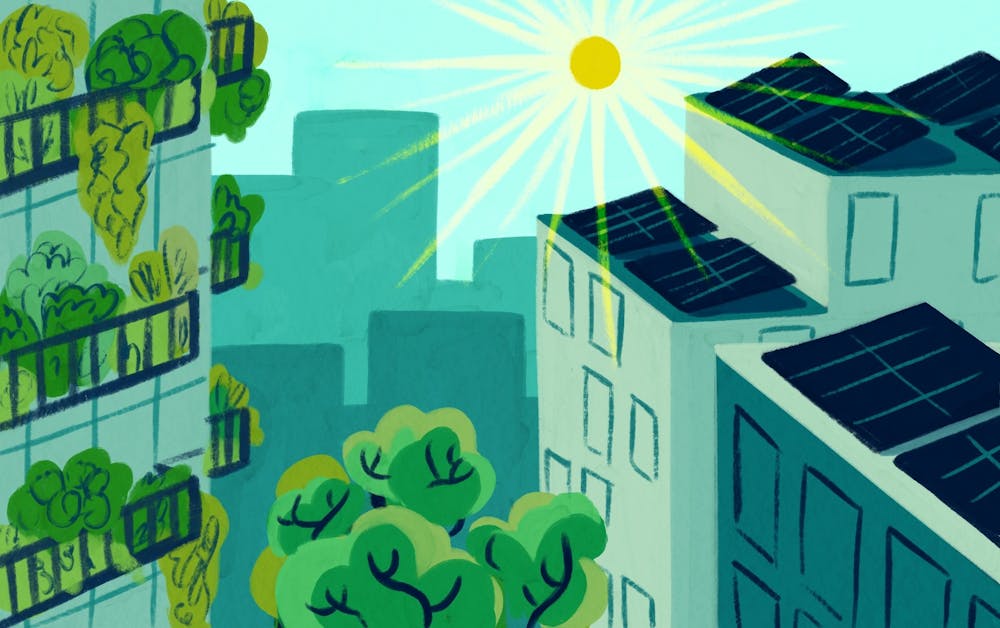The city of Tempe’s Sustainability and Resilience Commission updated its Climate Action Plan on Wednesday with new resources and research to strengthen the existing agenda, with focuses on youth, business, climate justice and neighborhoods.
The commission teamed up with organizations including Local First Arizona (LFA) to create agendas that develop a plan benefiting multiple communities in Tempe.
The update comes three years after the first version of the plan was released to the public.
Kendon Jung has been a part of the Tempe Sustainability and Resilience Commission for six years and is currently the commission chair. He is also a graduate student studying design, environment and the arts and a project manager for Zero Waste at ASU. He said the first plan was “a skeleton policy with the goal of creating policy space” for climate-focused action.
The first draft was also organized by three guiding principles: extreme heat resilience, energy resilience, and transportation. The new update takes a different approach, focusing on stakeholder agendas.
The Tempe Chamber of Commerce teamed up with LFA in order to develop who those stakeholders would be. They landed on youth, businesses, neighborhoods and those in need of climate justice.
Braden Kay, the director of sustainability for the city, said the plan aims to focus on the opinions, wants and needs of the community.
“We're really excited about this approach because this is one of the first times that in any kind of Climate Action Plan Update across the country that we've really given the power over to the people, over to the business community, and to the residents to help co-create this agenda," Kay said.
Nick Shivka, senior sustainability program manager at LFA, worked on the business end of the plan and has been working along with the city since October 2022.
“The original Climate Action Plan that was adopted in 2019 put together a roadmap that plotted out how the city would move forward, together with the community, on achieving carbon neutrality,” Shivka said. “I've seen evolution from the original Climate Action Plan in that this Climate Action Plan Update is acting on all of those listening sessions. Tempe has done such a great job with interacting with the community making sure to go into each neighborhood and each community and saying, ‘Hey, we want to hear from you.’”
This plan not only includes more feedback from the community, it also has more practical solutions and more specific policies and investments, Jung said.
“This next climate action update is going to have a little more meat and potatoes behind it, including program recommendations, human capital expansion and infrastructure investment. Because at this point, we know our leadership doesn't mean anything unless we are actually putting dollars to these components,” Jung said.
After creating these goals and areas of focus with the community, “then we're using those agendas to help guide what investments and what policies and what actions the city is going to take to support what residents and businesses already want to be working on,” Kay said.
READ MORE: Tempe updates its Climate Action Plan to include community perspectives
The youth agenda was created through listening sessions with high school students, college students and recent college graduates in order to gauge what younger generations are looking for.
The agenda includes an increase in food equity by lowering the cost of school meals, making healthier foods more accessible and affordable through urban gardening and composting, and increasing shade and water availability at transit centers and bus stops.
“Shaping Tempe to be responsive to what the youth are wanting and hoping for is a critical strategy for us to build a strong climate action plan,” Jung said. “There will always be new youth, they always have perspectives that we need to incorporate.”
The business agenda was put together by the Tempe Chamber of Commerce and LFA. It includes increased audits on water conservation on individual businesses, and working to allow grants and rebates to businesses that commit to the city’s goals on energy efficiency and sustainability.
LFA has a history of working with businesses around the state with its Arizona Green Business Certification, which evaluates an individual business on its energy and water usage and grants it a certification if the business meets the rigorous requirements.
“I think the most powerful piece here that Braden was really looking for, it was inviting businesses who had engaged in our programs or were already doing these things, walking the walk, through solutions that address these root causes," Shivka said.
Shivka said LFA invited local businesses to come to agenda topic and listening sessions to set an example for other businesses to follow.
The new plan also addresses climate justice and different neighborhoods. In the update meeting Wednesday, Kay presented data that showed how extreme heat affects specific neighborhoods in Tempe differently and unevenly.
"When we look at social factors for vulnerability in terms of percentage of residents below the poverty line, percentage of residents that are people of color and percentage of residents that are older, a lot of people with those attributes are vulnerable to extreme heat," Kay said. "There's a lot of people with those experiences living in the hottest parts of Tempe."
The plan aims to address this through the creation of resilience hubs. These hubs are community-serving facilities that distribute resources and emergency services to residents, Jung said. These hubs would store energy and be solar powered independent of the city’s energy grid.
Jung said the idea is that the hubs will “still have power instantly able to operate for several hours, if not a whole day without power for residents to gain access to air conditioning, to charge their phones and call family.”
READ MORE: Tempe youth council looks to find equitable solutions to climate issues
“The idea with this program is that we start at the school level, move to the neighborhood level and eventually convince the entire region through youth engagement and youth empowerment that we need to invest more in resilience to extreme heat,” Kay said in the update meeting on Wednesday.
The plan will be presented in a work study to the Tempe City Council on Feb. 17 and will be voted on for approval some time in March or April.
Reach the reporter at sbrenna5@asu.edu and follow @shanebrennan36 on Twitter.
Like State Press Sports on Facebook and follow @statepresssport on Twitter.

Shane Brennan is the Editor-in-Chief at The State Press. He was a sports and politics reporter, before becoming the editor of the politics desk. He has covered local and state politics for the Arizona Capitol Times and Cronkite News.




